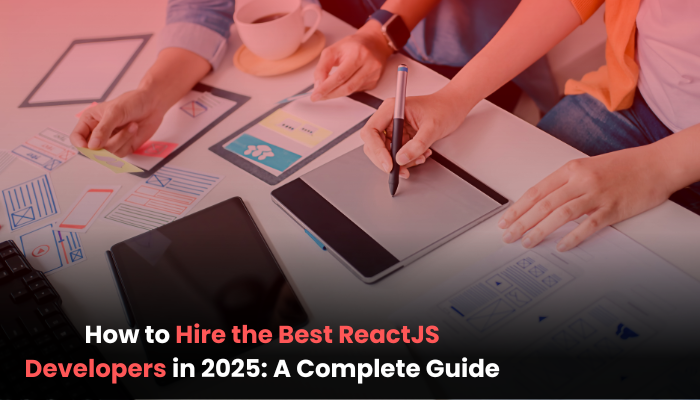How to Hire the Best ReactJS Developers in 2025: A Complete Guide
ReactJS has matured from being a trendy frontend framework into a cornerstone of modern web development. As more companies demand...

ReactJS has matured from being a trendy frontend framework into a cornerstone of modern web development. As more companies demand highly interactive, fast, and scalable applications, the competition to find and retain a skilled ReactJS developer has intensified. But hiring the best talent isn’t just about browsing through resumes it’s about knowing where to look, what to ask, and how to evaluate true skill.
Whether you’re building an internal SaaS platform, a customer-facing app, or enhancing your existing digital infrastructure, this guide will walk you through each step of hiring the best ReactJS developers in 2025.
1. Understand What a ReactJS Developer Really Does
A ReactJS developer isn’t just someone who knows how to use React. They’re engineers skilled at building performant user interfaces, managing state efficiently, and creating reusable components that scale. In most real-world projects, they also work with:
- RESTful APIs and GraphQL
- Redux or Context API for state management
- TypeScript or JavaScript ES6+
- Frontend testing frameworks like Jest or Cypress
- CI/CD pipelines and containerized environments (e.g., Docker)
Understanding the breadth of their role helps you write more precise job descriptions and filter out candidates who only have surface-level knowledge.
2. Define Your Project Needs Before Starting the Hiring Process
Before reaching out to any ReactJS developer, clarify your specific project requirements. Developers who excel in rapid MVP development might not be ideal for long-term architectural planning—and vice versa.
Consider–
- Do you need a developer for a short-term project or long-term role?
- Will the project involve integration with backend systems or databases?
- Are you building a mobile app using React Native?
- Will the developer work independently or within a larger team?
Being clear about these requirements helps attract candidates with the right balance of experience and problem-solving ability.
3. Choose Between Freelancers, In-House, and Outsourced Teams
One of the most important decisions is the employment model. Each has trade-offs in cost, flexibility, and control.
Freelancers-
- Ideal for short-term or low-budget projects
- Quick onboarding but higher risk of inconsistency
- Harder to scale or manage across time zones
In-House Developers-
- Better collaboration and control
- Higher salary expectations and hiring costs
- Suitable for long-term, complex applications
Outsourced Teams-
- Access to vetted talent at a reasonable cost
- Scalability and reliability
- Great for ongoing support and maintenance
Outsourcing is often the best middle ground if you want top-quality work without the HR hassle.
4. Evaluate Technical Proficiency Beyond Just the Resume
It’s easy for someone to claim React experience, but harder to prove it in real-world contexts. A truly capable ReactJS developer will showcase:
- Clean, maintainable code following React best practices
- Strong understanding of component lifecycle methods
- Mastery in hooks such as
useEffect,useState,useCallback - Familiarity with code-splitting and lazy loading for performance
Conduct technical evaluations that test for-
- Component architecture
- State management in complex UI flows
- Use of async/await for API handling
- Writing unit and integration tests
Ask them to walk through a portfolio project or contribute to a mini-task similar to your actual work. This reveals both their technical and problem-solving skills.
5. Assess Soft Skills That Influence Project Success
While technical expertise is essential, the best ReactJS developers are also strong communicators and collaborators. Since most frontend tasks involve feedback cycles, your ideal hire should be comfortable with iterative workflows and cross-functional communication.
Key soft skills to look for–
- Ability to explain technical concepts to non-technical stakeholders
- Adaptability to shifting requirements or feedback
- Problem-solving mindset over just “following specs“
- Accountability and time management especially in remote roles
These traits can be harder to measure but are often the difference between a successful project and a delayed one.
6. Know Where to Find Top ReactJS Talent
General job boards can yield dozens of applicants but not necessarily qualified ones. To find the best ReactJS developers, tap into platforms and communities where top talent congregates.
Best platforms for sourcing:
- GitHub & Stack Overflow (review open-source contributions)
- LinkedIn (targeted searches via filters)
- Invedus Outsourcing (vetted remote developers)
- Upwork or Toptal (freelancers, with quality controls)
- AngelList (for startup-focused developers)
A niche agency or outsourcing partner often provides pre-vetted candidates who are easier to onboard and manage than direct freelancers.
7. Structure an Effective Interview Process
A well-planned interview process filters out unfit candidates without consuming weeks of your time.
Recommended structure–
- Screening Call: Discuss project scope, developer expectations, and basic tech fit
- Technical Interview: Dive into React fundamentals, state logic, performance optimizations
- Live Coding Challenge: Build a functional component with a clear UI/UX focus
- Team Fit Round: Evaluate collaboration, communication, and feedback-handling
Ensure you offer candidates clarity and structure throughout the process—it sets the tone for how your company treats developers.
8. Offer Competitive Compensation and Flexible Work Arrangements
The demand for skilled ReactJS developers has made compensation packages more competitive in 2025. Beyond salary, developers now value:
- Remote work flexibility
- 4-day workweeks or flexible hours
- Annual learning budgets
- Autonomy in tech decisions
Make sure you benchmark salaries against regional and global standards. A happy, respected developer will always deliver better outcomes.
9. Retain Top Developers with a Growth-Driven Environment
Hiring is only half the battle retention matters just as much. To keep your top ReactJS developer motivated-
- Offer regular performance reviews with actionable feedback
- Encourage contributions to open-source or company R&D
- Provide a clear path for career advancement
- Foster a collaborative, blame-free culture
Retention hinges on growth opportunities and meaningful work not just perks.
10. Choose a Trusted Partner to Hire ReactJS Developers
If you’re not ready to manage the full hiring process in-house, consider working with a trusted partner. Invedus Outsourcing offers access to experienced ReactJS developers who are already vetted, trained, and ready to contribute to your project from day one.
By partnering with Invedus, you get-
- Dedicated developers at offshore pricing
- Full-time availability in your time zone
- A flexible engagement model with quick onboarding
Visit Invedus.com to explore how they can help you hire ReactJS developers efficiently and affordably.
Final Thoughts
Hiring the right ReactJS developer in 2025 is about more than checking off a list of skills. It requires a strategic approach to sourcing, evaluating, and onboarding developers who fit your project and culture. By focusing on technical depth, soft skills, and a streamlined process, you set yourself up for long-term success.





